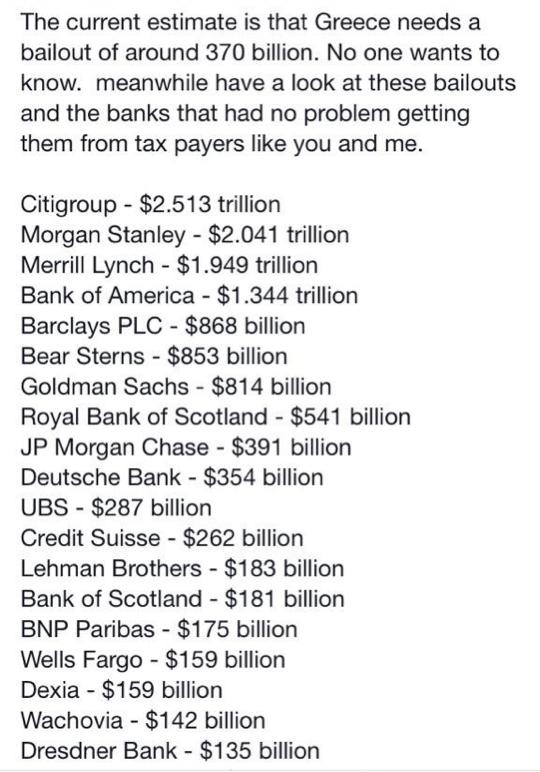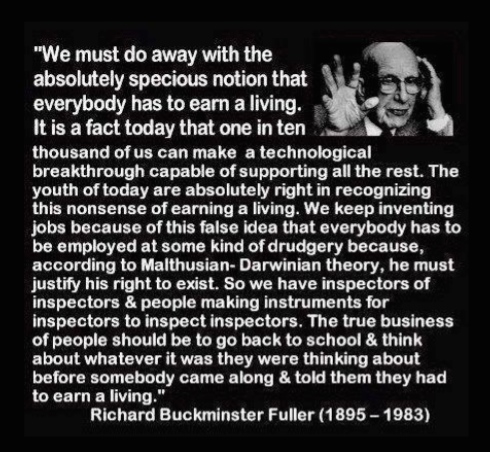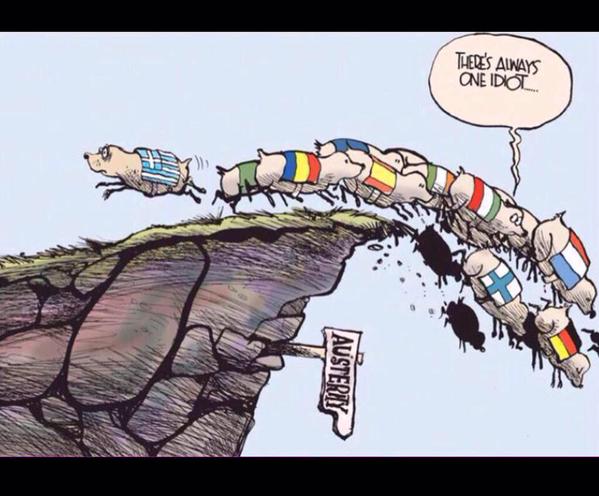Finding a Balance in Society
Richard Buckminster Fuller, an amazing man who published 30 books and during his lifetime he worked tirelessly at finding conditions that would lead to a balance in society. Check the section on ‘Depression and epiphany’ in the link.
Introduction
All I need do is start reading a comment such as that above or the cartoon and linked articles in the footer and I’m off on a new venture of trying to put my own thoughts in some kind of logical order. Because these posts often ‘evolve’ over time, this article will likely change as I do more reading and correct some of the logical errors. However, most of you who choose to read this will get a pretty good idea of where I stand ideologically. Why do I do it? Well, it’s fun and I like trying to make sense of the world around me. Perhaps Greece is melting down, but, then again, perhaps the challenges the Greeks face is just a symptom of the greater socioeconomic challenges that face mankind. Some friends on FB make reference to the bloody ‘socialists’ in Greece as being the problem, others blame the banks. I rather suspect they all contribute an equal share.
Finding a Balance in Society
The above meme was originally posted by the Occupy Wall Street group. It was then re-posted by a FB friend Ted Godwin, a generally quiet and non-controversial guy. His comment: “Now, somebody needs to point out to the 1% how land “ownership” is simply a paradigm for organization of physical space agreed to by society rather than an inviolable right.”
While the above comments do not wholly match the content below, they did prompt me to think more about the manner in which people are governed and how we seek to find a balance between competing societal social interests. As we approach an election (for that matter any election) people seem to sink to the lowest common denominator with their meme’s and comments. It seems that once we have set our minds on an ideological course, that ideology sticks like crazy glue. As for attack ads and posters, every political party does it, but some are much better at it than others. I suppose that is why we end up taking extreme positions on just about every issue. Distill it down to one sentence or one photo and that is our position. This demonstrates why we so often fracture on overarching issues.
On one extreme we have supporters of absolute free enterprise as being the best (only?) solution for the distribution of wealth and well-being of mankind. That extreme is represented by the richest 10%, the Donald Trump’s, the multinationals and the moneyed class of the world. These free enterprisers suggest a trickle down effect works to promote economic prosperity and equity in society. Give the money to the rich, let them build businesses that generate wealth, then let that wealth trickle to the masses. The state is often seen as a blockage point to the wealth generation. It comes across as a good idea, but the poor and middle class might wish to raise a few question about the actual outcomes.
At the other extreme we have full blown Communism where the state exercises total control of the wealth and systems of well being. Communist parties insist they govern in the interests of the people (e.g. The Peoples Republic of China, the Peoples Court of the Peoples Republic, etc.). In our society the word socialist is often paired with Communism, but that is just another extreme used to inflame. Putin’s Russia is a further example of total control by a small group of super rich who are one small step away from a complete dictatorship. All sides often wrap themselves in a nationalist flag to demonstrate they are working in the best interests of the people.
Not unexpectedly, these extremes all end up achieving the same ends. In one, the free enterprisers, wealth (and power) is accumulated by a few whose personal interests tend to supersede that of everyone else. The Wall Street Traders and Banks come to mind (meme on right). It seems they are again heading in that direction as High Frequency Traders, Dark Pools and milliseconds in lead time, is increasingly used to game the system. It is a system in which wealth accumulation among big banks and multinationals make them ‘to big to fail’. Greece and the Greek Debt is small by comparison. Compare Greek debt that to that owed by the United States and the US is certainly to big to fail, but who, other than China, could bail out the US?
accumulated by a few whose personal interests tend to supersede that of everyone else. The Wall Street Traders and Banks come to mind (meme on right). It seems they are again heading in that direction as High Frequency Traders, Dark Pools and milliseconds in lead time, is increasingly used to game the system. It is a system in which wealth accumulation among big banks and multinationals make them ‘to big to fail’. Greece and the Greek Debt is small by comparison. Compare Greek debt that to that owed by the United States and the US is certainly to big to fail, but who, other than China, could bail out the US?
In Russia, a man like Putin and his team of oligarchs do the same thing as the big banks, except they don’t even bother to try and cloak their dealings in respectability. In that regard they are likely more honest than the Wall Street bankers and traders.
Photo: (Web Source): This list came with an article about Greece, but also makes a point about accumulation of wealth by the 1% and the origins of that wealth. See cartoon and links in the footer for more on the Greek crisis.
It is my considered opinion, after having shuffled around this planet for 3/4’s of a century, that having a large and relatively well-to-do middle-class holding sufficient economic and political clout to make the extremes sit up and listen (and really listen) is what helps to balance the scale. Perhaps if all the money was held by the middle class and small business that was governed by a strong socially oriented government, the wealth might then be allowed trickle out to the extremes just to keep them content with having a bit more than others..
Of course, in all this I stand with democracy, as I think an elected government provides the greatest opportunity to achieve a balance, but even democracy cannot avoid the pitfalls. This happens because money talks and when it does, governments listen. In that regard the 1% (or 10%) have a far greater voice and can influence outcomes in a manner that can never be achieved by the 90%. In 2008 when Wall Street rigged the system in their favour, then failed, the cost of that failure was simply transferred to the middle class. With only a few exceptions, Wall Street kept chugging along with the same shysters still in command. By way of comparison, if an ordinary citizen started robbing banks to try and even things soon, be would soon be looking out from behind bars. Another post, an Oak Bay Bank Heist, discusses this phenomena.
Speaking of money transfers, did you know the Greek of some 340 billion was transferred to the EU and IMF as a means to relieve the large private banks (who originally loaned the money to Greece) from suffering the effects of a possible default. Those private banks should have suffered the default for making such stupid loans and Greece might not now be facing a crisis. Look what happened in the US when banks began approving all those sub-prime mortgages to purchases who could never make good on the loans if the market came apart.
As it is now, if (when) Greece goes into default the loss will be spread around among middle class with poor take the biggest hit just as happened in the United States after 2008. In this case the hit will be small – 340 billion compared to the 13 trillion given to the banks after 2008. In the process of these defaults, the top 1 -10% actually become relatively better off as the bottom 90% are left to pick up the pieces, just as ordinary Greeks will be asked to do. We clearly need a strong Government system that can hit back in favour people, rather than in favour of the banks, big business and monied class who often precipitate these situations. You see now how easily I display my ideology?
On the other hand, countries within the Communist realm and other dictatorships, such as Russia are generally worse off as there is seldom a chance to change the ruling authority other than by revolution, but to suggest that absolute free enterprise is likely to be more fair than communism or or an oligarchy, would, in my opinion, be wrong. Both take advantage of the poor and middle class as they enrich themselves.
While it takes a revolution to bring change, one thing Occupy Wall Street has found following the failure of the early movement, is that a revolution can now be initiated through Social Media rather than with flags, placards, clubs, protests and  tear gas on the street. It is no wonder communist countries and dictatorship use every means possible to control social media. I rather expect several democratic governments will soon be working to bring limits to social media as a means to better control the message.
tear gas on the street. It is no wonder communist countries and dictatorship use every means possible to control social media. I rather expect several democratic governments will soon be working to bring limits to social media as a means to better control the message.
Photo (Web Source). Oops, I put them on the left. Was that a Freudian slip on my part? Here Stephen Harper looks with admiration at that which was accomplished by Mike Harris in his Common Sense Revolution. It seems there was not much common sense in that revolution and those chickens are now coming home to roost.
While I often speak harshly of governments that trample citizen rights, I still favour democracy as providing the best chance at maintaining a strong middle class and the equity that brings within a social system. The danger, as has been happening in Canada and other countries that have steadily moved towards a conservative style, authoritarian democracy, is that big business, special interests and the monied class tend to game the system. It is a movement that started in England and the United States under leadership of Thatcher and Reagan in the 1970’s, then entered Canada big-time through the Common-Sense Revolution that took Ontario by storm in the 1990’s. But, it seems, change is on the horizon.
We all watched in amazement as Albertans voted to begin moving their Province towards a more people oriented system and early indicators suggest Canada is moving in that same direction. Only time will tell whether we can succeed in rebuilding a balance in which wealth and well-being becomes more evenly spread across the spectrum than it is in a country owned by big oil, big business and big money.
Harold
This cartoon and the following links arrived on FB via my nephew Lorin Yochim. If you have time to scan the links you might come away with a few new perspectives on the ‘Greek Crisis’.
Greece Just Taught Capitalists a Lesson
(356)
Trackback from your site.


